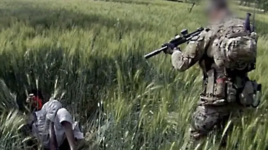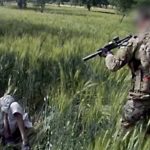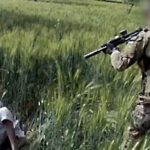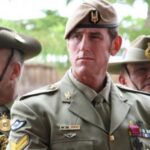The International War Crime of Wilful Killing in Australian Law

A former member of the elite Special Air Service (SAS) is the first Australian Defence Force (ADF) personnel in Australian history to be charged with the international war crime of wilful killing under Australian law.
Afghanistan war veteran Oliver Schulz, is the first to be arrested following a joint investigation between the Office of the Special Investigator (OSI) and the Australian Federal Police (AFP), which was set up in the wake of the Brereton inquiry into Australian Special Forces’ which investigated misconduct reported by the Australian Broadcasting Corproation.
Documents were originally leaked to ABC journalists, by former Australian Defence Force lawyer David McBride, who is still facing prosecution by the Australian Government.
The offices of the ABC were raided in 2019, attracting a global debate about press freedom.
For a long time it seemed that there may be no progress at all on the matter, despite the Brereton Report confirming much of what had been leaked, and reported. It found “credible information” of 23 incidents in which one or more civilians or prisoners of war were unlawfully killed by or at the direction of members of the Special Operations Task Group, “in circumstances which, if accepted by a jury, would be the war crime of murder”. The report recommended nineteen individuals be referred to the police for further investigation.
Mr Schulz is now charged with the international war crime of wilful killing.
The OSI and the AFP have issued a statement saying “it will be alleged he murdered an Afghan man while deployed in Afghanistan with the Australian Defence Force.”
Killing a civilian
The Four Corners program, Killing Field, included footage taken from a helmet camera in 2012, worn by the dog handler from Mr Schulz’s patrol. It shows an SAS dog mauling Mr Mohammad in a field, before the dog is called off and Mr Schulz is seen aiming his weapon at the man.
The ADF conducted an internal investigation into the incident after complaints from local villagers, but cleared Mr Schulz of wrongdoing, accepting an explanation that Mr Mohammed had been shot in self defence.
Mr Schulz was awarded the Commendation for Gallantry for his service in Afghanistan, where he completed multiple tours and was stood down by the ADF after the killing was made public in the television programme.
Mr Schulz is currently remanded in custody and is expected to appear at Sydney’s Downing Centre local court in May.
The case is likely to be highly controversial. Australia has a culture that glorifies its “war heroes” and there have certainly been many of them throughout history. But the Brereton Report certainly burst the bubble around the idea that we should ‘celebrate and revere’ our soldiers.
There have also been a lot of questions about the culture of toxic masculinity within the defence force, in particular special forces, and how much responsibility the ADF needs to take for allowing the culture to develop, and for not providing critical support to soldiers who have suffered trauma as a result of several tours of duty.
Mr Schulz’s prosecution also marks an historical turning point for our ally countries, which have in the past, avoided holding war crimes trials in civilian courts.
British Hearings into alleged killings by Special Forces
However, a public inquiry into allegations that members of British special forces carried out dozens of extra-judicial killings during night raids in Afghanistan is also currently underway in London.
It was ordered by the British Government’s defence ministry after a BBC TV documentary reported last year soldiers from the elite Special Air Service (SAS) had killed 54 people in suspicious circumstances.
The continued prosecution of David McBride
In the meantime, the original whistleblower, David McBride is still being prosecuted by the Australian Government, facing five charges (reduced from 13) including the unauthorised disclosure of information, theft of commonwealth property and breaching the Defence Act.
If found guilty, he faces the prospect of decades behind bars, despite a growing body of evidence of wrongdoing by soldiers, evidence that Mr McBride witnesses first hand to a degree during his own time in Afghanistan.
He originally raised the matters unsuccessfully internally within the ADF, and then felt the information needed to be made public.
Last year David McBride’s lawyers withdrew an application for him to be protected under the whistleblower act, after the commonwealth moved to suppress expert evidence crucial to the trial.
Many people believe the charges should be dropped. There remains one glimpse of hope for McBride avoiding trial and that is an overhaul of the Public Interest Disclosure laws which has been promised by the Attorney General Mark Dreyfus.
Ben Roberts-Smith defamation case
The other case which has arisen from the leaked information, the Afghan Files, and the Brereton Report is the Ben Roberts-Smith defamation case against three newspapers –
The Age, The Sydney Morning Herald and The Canberra Times.
Mr Roberts-Smith, who is one of the most highly decorated members of the Australian Defence Force alleges that the newspapers defamed him in a series of articles that accused him of committing war crimes, including murder. He denies all wrongdoing. The newspapers have defended their reporting as the truth.
The trial has finished and the case is awaiting the Federal Court’s judgement.
The international war crime of wilful killing in Australian law
The international war crime of wilful killing comes under section 268.24 of the Criminal Code Act 1995 (Cth), and carries a maximum penalty of life in prison.
To establish the offence, the prosecution must prove beyond reasonable doubt that:
- A person (‘the killer’) caused the death of another,
- The person killed was protected under a Geneva Convention,
- The killer knew of, or was reckless to, the circumstances establishing that the other person was protected under a Geneva Convention, and
- The killer’s conduct took place in the context of, and associated with, international armed conflict.
What is the meaning of ‘caused the death’?
The killer ‘caused’ the other person’s death if his or her conduct substantially contributed to it.
What is recklessness?
The killer was ‘reckless’ if he or she was aware there was a substantial risk that the orhee person was protected under a Geneva Convention, but went ahead with his or her actions regardless.
Who is protected under the Geneva Conventions?
Persons protected under the Geneva Conventions include:
- Civilians,
- Wounded combatants,
- Prisoners of war,
- Medical and religious personnel attached to armed forces, and
- War correspondents.
What is international armed conflict?
‘International armed conflict’ includes, “all cases of declared war or of any other armed conflict which may arise between two or more… [nations] even if the state of war is not recognized by one of them”. It covers “all cases of partial or total occupation of the territory… [of a nation], even if the said occupation meets with no resistance”.
Legal defence
Self defence is a complete defence to the charge.
In the event evidence of the defence is raised, the onus then shifts to the prosecution to prove beyond a reasonable doubt that it does not apply in the circumstance.
A verdict of ‘not guilty’ must be returned if the prosecution is unable to do this.







